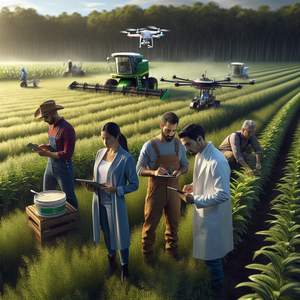
Exploring High-Demand Careers in Agriculture: A Look at Opportunities and Growth Trends
Agriculture plays a vital role in the global economy, influencing both employment rates and food security. In the United States alone, around 22.1 million jobs are tied to the agriculture and food production sectors, representing approximately 10.4% of total employment. This statistic underscores the vast array of career paths available in agriculture, which now extends well beyond traditional farming. As the industry adapts, integrating technological advancements and sustainable practices, the demand for a skilled workforce that combines foundational agricultural knowledge with advanced technical skills is on the rise.
Job Summaries:
Farmer:
- Farmers are responsible for cultivating crops and raising livestock.
- Duties include managing planting schedules, monitoring crop health, and ensuring animal welfare.
- Staying informed about the latest agricultural techniques and technologies is essential for optimizing production.
- A high school diploma may suffice for entry, but many farmers benefit from further education in agricultural science or business.
- Farmers play a crucial role in maintaining food supply chains, contributing to economic stability.
Farm Manager:
- Farm managers oversee the daily operations of farms, ensuring efficiency and productivity.
- Responsibilities include staff management, budgeting, and implementing best practices in agriculture.
- A degree in agriculture or a related field is often needed.
- Strong leadership and organizational skills are important.
- Farm managers are pivotal in maximizing productivity while adhering to sustainable farming practices.
Crop Production Technician:
- Crop production technicians assist in the cultivation and harvesting of crops.
- They apply scientific principles to enhance yield and quality.
- Their tasks involve conducting soil tests.
- They monitor plant health.
- They apply fertilizers and pesticides as necessary.
- A background in agricultural science or related fields is beneficial.
- Strong analytical skills are important.
Agronomist:
- Agronomists focus on soil management and crop production.
- Conducting research to develop improved farming practices.
- Responsibilities include analyzing soil conditions.
- Recommending crop rotations.
- Advising farmers on pest management strategies.
- Typically, a degree in agronomy, soil science, or a related field is required.
Crop Manager:
- Crop managers oversee the production of specific crops.
- They coordinate planting, growth, and harvesting schedules.
- They analyze market trends to determine the most viable crops to plant.
- They manage resources effectively.
- This role often requires a degree in agriculture or business management.
- Practical experience in crop production is also necessary.
Agricultural Equipment Technician:
- Responsible for maintaining and repairing machinery used in farming
- Agricultural equipment technicians troubleshoot mechanical issues
- Perform routine maintenance
- A background in mechanics or a related field is essential
- Complemented by specialized training in agricultural machinery
Food Scientist:
- Food scientists work to enhance the safety, quality, and nutritional value of food products.
- Typically working in laboratories, they conduct research on food preservation, processing, and packaging.
- A degree in food science or a related field is essential, along with strong analytical and problem-solving skills.
Agricultural Sales Representative:
- Agricultural sales representatives promote and sell products and services to farmers and agribusinesses.
- A solid understanding of agricultural practices and products is crucial.
- Excellent communication skills are essential.
- A degree in agriculture, business, or a related field is often preferred.
Irrigation Specialist:
- Irrigation specialists design and manage irrigation systems to ensure crops receive adequate water supply.
- They assess water needs, install irrigation systems, and monitor water usage.
- A background in agricultural engineering or environmental science is advantageous, along with technical skills in system installation and maintenance.
Sustainability Coordinator:
- Sustainability coordinators develop and implement eco-friendly agricultural practices.
- They assess environmental impacts, promote resource conservation, and collaborate with farmers to adopt sustainable methods.
- A degree in environmental science, agriculture, or a related field is typically required.
These ten job roles provide just a glimpse of the diverse career opportunities within the agricultural sector. As the industry continues to evolve, new positions will emerge, offering exciting prospects for those committed to enhancing food security and sustainability. With a growing demand for skilled professionals and the integration of technology into agricultural practices, now is an ideal time to explore these fulfilling and stable employment paths.
Explore More Jobs

